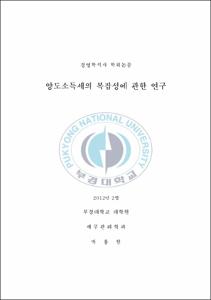양도소득세의 복잡성에 관한 연구
- Abstract
- A Study on the Complexity of Capital Gains Tax Law
Park, Yong-Hyun
Department of Tax Administration
Graduate School of Business Administration
Pukyung National University
Abstract
The objectives of the study are ① to factor out three problems, among other factors in the complexity of the capital gains tax law (CGTL, hereafter), including too much non-taxable items and exemption provisions of the system, the complexity of the tax-rate structure of CGTL with heavy tax-rate on non-business lands and multi-housing taxpayers, and frequent changes in capital gains tax policy for last 12 years and ② to suggest some reform measures for the improvement of these three problems, respectively.
The followings are the discussions of the three problems in more details and suggestions for the improvement of these three problems, respectively.
Firstly, non-taxable items and exemption provisions in the current CGTL is too broad and wide to fairly operate the system. These problems result in unfairness of the system. In order for the tax authority to prevent the complexity in non-taxable items and exemption provisions, tax rule have to reduce the range of non-taxable items and exemption provisions.
Secondly, the tax-rate structure of CGTL and heavy tax-rate on non-business lands and multi-housing taxpayers are too complex to operate the system fairly. These problems result in adverse impact on the allocation of resources, income redistribution and assets freezing effects on Korean economy. In order for the tax authority to prevent complex tax-rate problems and heavy-rate problems on certain assets, following measures are needed for the improvement. The complex structure of tax rate in the current CGTL should be simplified and the rules of a heavy capital gain taxes for non-business lands and double penalties who have more than two houses should be abolished (or deleted) from the current CGTL.
Thirdly, frequent changes in capital gains tax policy for last 12 years also result in adverse impact on the allocation of resources, income redistribution and assets freezing effects. In order for the tax authority to prevent these adverse impacts on Korean economy and ultimately to improve the current tax system, Korean government have to cut current tax rate to a reasonable level and simplify tax-rate structure.
- Issued Date
- 2012
- Awarded Date
- 2012. 2
- Type
- Dissertation
- Publisher
- 부경대학교 경영대학원
- Affiliation
- 부경대학교 경영대학원 세무관리학과
- Department
- 경영대학원 세무관리학과
- Advisor
- 김태용
- Table Of Contents
- 제Ⅰ장 서 론 1
제1절 연구의 필요성과 목적 1
제2절 연구의 방법과 범위 3
제Ⅱ장 양도소득세의 이론적 배경 5
제1절 조세법의 기본원칙 5
제2절 양도소득세의 도입배경 10
제3절 양도소득세 과세에 관한 이론 12
제4절 우리나라의 양도소득세 14
제5절 양도소득세의 주요 개정 연혁 24
제Ⅲ장 양도소득세의 복잡성의 내용 34
제1절 경제적 효과 검토 및 계산구조의 복잡성 34
제2절 양도소득세의 선행연구 39
제3절 비과세와 감면제도의 복잡성 내용 42
제4절 세율구조의 복잡성 내용 47
제5절 세율변화의 복잡성 및 중과세율의 문제점 49
제6절 외국의 양도소득세 제도와의 비교 53
제Ⅵ장 양도소득세의 복잡성에 관한 문제점과 개선방향 58
제1절 비과세 및 감면제도의 문제점과 개선방안 58
제2절 세율구조 등의 문제점과 개선방안 61
제3절 중과세율의 문제점과 개선방안 64
제4절 바람직한 조세제도 69
제Ⅴ장 결 론 71
참 고 문 헌 73
- Degree
- Master
- Files in This Item:
-
-
Download
 양도소득세의 복잡성에 관한 연구.pdf
기타 데이터 / 633.56 kB / Adobe PDF
양도소득세의 복잡성에 관한 연구.pdf
기타 데이터 / 633.56 kB / Adobe PDF
-
Items in Repository are protected by copyright, with all rights reserved, unless otherwise indicated.